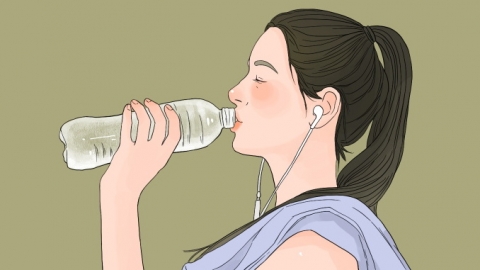Why do I still feel thirsty even after drinking a lot of water all of a sudden? What should I do?
Generally, sudden and persistent thirst despite drinking a lot of water may be caused by insufficient water intake, high-salt diet, diabetes, diabetes insipidus, Sjögren's syndrome, or other conditions. It is recommended to seek timely medical advice and receive treatments such as general care or medication under a doctor's guidance. A detailed analysis is as follows:

1. Insufficient Water Intake
When the body does not replenish water for a prolonged period or is in a high-temperature environment, significant water loss through perspiration and respiration may increase blood osmotic pressure, stimulating the thirst center and causing intense thirst. In daily life, it is important to drink water regularly and in adequate amounts. Especially during exercise, hot weather, or working in dry environments, additional hydration is necessary to prevent dehydration.
2. High-Salt Diet
Consuming excessive salt increases the concentration of sodium ions in the body. To maintain osmotic balance, the body retains more water, which simultaneously stimulates the thirst center, resulting in a sensation of thirst. It is recommended to reduce intake of high-salt foods, such as pickled foods and fast food, and opt for low-salt, balanced diets.
3. Diabetes
Diabetes is an endocrine disorder caused by various pathogenic factors including genetic predisposition, immune dysfunction, and microbial infections that impair pancreatic function and lead to relative or absolute insulin deficiency, thereby causing disturbances in carbohydrate metabolism. Hyperglycemia causes osmotic diuresis and significant loss of body fluids, potentially leading to thirst. It may also be accompanied by symptoms such as polyuria (excessive urination) and weight loss. Under medical guidance, medications such as metformin hydrochloride tablets, glibenclamide tablets, and acarbose tablets may be used for treatment.
4. Diabetes Insipidus
Diabetes insipidus is caused by insufficient secretion of antidiuretic hormone (ADH) or kidney insensitivity to ADH, leading to impaired urine concentration. When large volumes of urine are excreted, excessive fluid loss may cause severe thirst, accompanied by symptoms such as low-specific-gravity urine and irritability. Patients may take desmopressin tablets, chlorpropamide tablets, carbamazepine tablets, or other medications as directed by a physician.
5. Sjögren's Syndrome
Sjögren's syndrome is an autoimmune disease that damages exocrine glands such as salivary and lacrimal glands. Reduced saliva secretion leads to dry mouth and the associated symptoms. Patients may also experience dry eyes and skin dryness. Under a doctor's recommendation, patients may use medications such as hydroxychloroquine sulfate tablets, total glucosides of paeony capsules, and levamisole hydrochloride tablets for treatment.
In daily life, maintaining adequate hydration by drinking water regularly and in appropriate amounts is important. Avoid going long periods without drinking water or consuming excessive amounts of water at once. Additionally, maintain a balanced and diverse diet.








